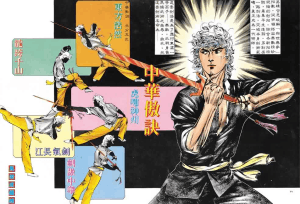Chinese Hero

If you told Hua Ying-Xiong (literally "China Hero"), the young son of a blacksmith and his sword-master wife, that he would be protecting Chicago's Chinatown from Kung-Fu Mafiosi and dueling to the death with a blind samurai master on the Statue of Liberty 17 years from now, he would probably laugh. The boy was content flirting with his childhood sweetheart Jie Yu ("Pure Jade"), helping his father at the forge, and playing pranks on the arrogant Westerners who terrorized his village, like any other red-blooded Chinese boy during the Great Depression.
Fate, in all her cruelty, filled the hearts of the white invaders with greed for his family's priceless heirloom on his 18th birthday. Such was the Chi Jian, a sword of crimson metal that glows with murderous red when given its drink of blood. For this fabled weapon his parents were murdered. Avenging their deaths by killing the western murderers, Ying-Xiong himself was forced into exile in America.
Coincidence after miraculous coincidence followed in his journey in the west, as Ying-Xion chanced upon one Chinese master after another, who like himself had fled to America. Inheriting their combined strength, swordsmanship and martial arts, Hua Ying-Xiong became the champion of the Chinese people in the crime-ridden and racist city of Chicago by his 35th year. Standing alongside faithful comrades like Gui-Pu (Ghost Servant) the armless assassin and Lo-Han the monk, Ying-Xiong fearlessly wages war against the machinations of the Black Dragon Syndicate, a Western criminal army whose warriors' skills are such that they rival criminals who stoop to using guns.
Thus begins Chinese Hero (or 中華英雄, "Zhong Hua Ying-Xiong"), the martial arts magnum opus of Hong Kong Manhua (the Chinese equivalent of manga) artist Ma Rong-Chen. It is an epic melodrama of violence, compassion, evil, honor and bravery, featuring some of the most creative interpretations of western villains with kung fu.
The story reaches its high point in the "Invincible" arc, wherein Ying-Xiong is forced into conflict with Invincible, a samurai so obsessed with battle he abandoned his family and destroyed his own eyes to be rid of all "unnecessary" emotions. This culminates in a climactic battle on top of the Statue of Liberty, in which the pride of Chinese and Japanese martial arts is put to the test.
- A God Am I: The consequence of mastering "Evil Kung Fu" is becoming a megalomanical tyrant.
- Affably Evil: The Black Dragon Commander.
- Anti-Hero: Hua Ying-Xiong becomes progressively colder and crueler with every friend and loved one he loses.
- Battle Aura
- Blessed with Suck: Sure, Gui-Pu is a master of kicking... only he has no arms and is hideously disfigured, hence "Ghost Servant".
- Complexity Addiction: In spite of Ying-Xiong's mother being shot to death in China in the first chapter, the Mafiosi of Chicago, cesspool of gun-violence in the real 1930s, conveniently forgot how to fire a gun and use spears, crossbows and kung fu instead.
- Conservation of Ninjitsu: The Black Dragon Syndicate's laughably weak mooks.
- Contrived Coincidence: One or two masters, it's easy to accept, but having almost every major master of the Chinese Warrior Arts flee to Chicago in America is just a bit too much to swallow.
- Dangerous Forbidden Technique: The "China Secret" in the movie.
- Everybody Was Kung-Fu Fighting: Even Mafiosi who run guns.
- Good Scars, Evil Scars: Hua Ying-Xiong's signature vertical facial scar: Good Guy.
- Guns Are Worthless: One of the best examples of this trope.
- Honor Before Reason
- Katanas Are Just Better: Averted. This is a Chinese work and the Chinese straight-sword, the jian, is the finest weapon in this world.
- Kick the Dog
- Live Action Adaptation: In two flavors - the '80s TV series that lasted two seasons and remained quite faithful to the source, or the Big Damn Movie A Man Called Hero in '99, which was... not so close.
- MacGuffin: The invincible Red Sword Chi-Jian.
- Monumental Battle: The Crowning Moment of Awesome of the entire franchise: a final battle atop the Statue of Liberty itself.
- Monumental Damage: With their swords and energy techniques, they manage to cut up bits of the Statue of Liberty mentioned above.
- Old Master: Jing-Ao (Golden Pride), South Palm God, Sword Saint.
- Screw Destiny
- Rule of Cool: This is an idealized world in which traditional Chinese warrior culture was not destroyed before the mid 20th century by a malign combination of European colonialism, Japanese invasion, and China's collapse into war and chaos.
- To Be a Master
- Tragic Hero: Ying-Xiong was literally born under the Star of Death, dooming anyone who associates with him, friend, family, or foe, to die a tragic death.
- Training Montage: Nicely done ones too, particularly in the earlier volumes.
- Unlucky Childhood Friend: Jie-Yu, Ying-Xiong's doomed wife and the mother of his son Jian-Xiong.
- White-Haired Pretty Boy: Such was the effort that Ying-Xiong put into creating his School Of Swordsmanship Zhong Hua Ao Zue ("Techniques of Chinese Pride", pictured above), his hair turned white from the exertion.
- Wuxia
- You Can't Fight Fate: Doesn't stop Ying-Xiong from trying though...